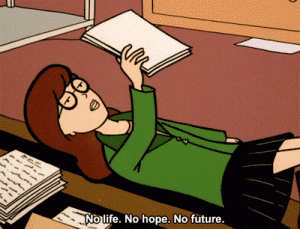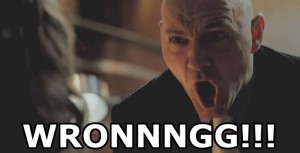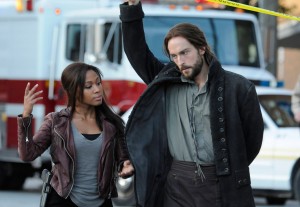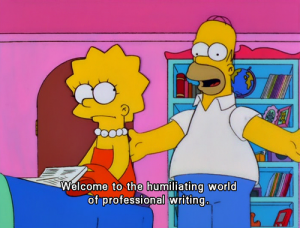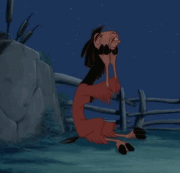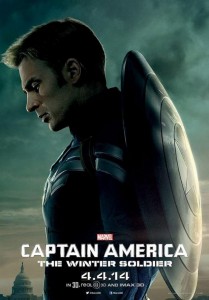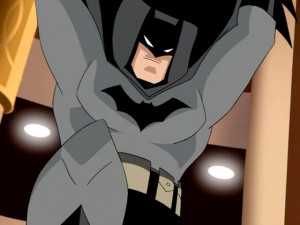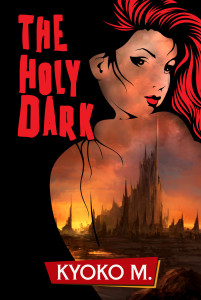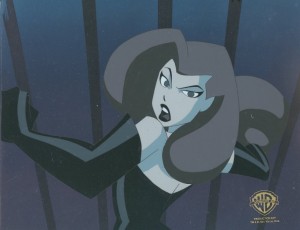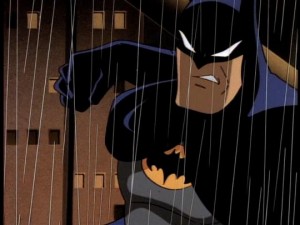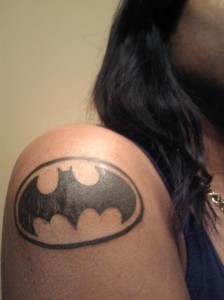
For once, the American people and I agree on something, and that is that Maleficent is pretty much a godsend and awesome and everything we were hoping it would be.
And yet.
It’s doing quite, quite well at the box office, but I can’t help but notice that it’s not getting more attention considering the quality of the film. I think Maleficent is fantastic from stem to stern, but as much as people like it, it hasn’t taken the world by storm like the last Disney film. I can’t abide that, dammit. It’s time to speak up about the differences between the two princess-centered films and why I think Maleficent succeeded where Frozen failed, and why it deserves more credit.
1. Because Maleficent is an actualized, three-dimensional character and not just a cardboard cut-out with a pretty face. Look, Frozen fans, I am not at war with you, but I do need you to see the many problems with the film, particularly with Elsa and Anna. They’re not fully realized characters. And Maleficent is. Her story is her own and she controls it, motivates it, changes it, and conquers it. Maleficent is an active protagonist AND antagonist, which is something Elsa severely lacked in Frozen. Maleficent started out just as sweet as can be and then was dealt something beyond cruel by the man she loved and so she took matters into her own hands. What’s more is that the narrative itself doesn’t try to pull a Loki and make it seem like she’s totally justified. It acknowledges that her curse was a horrid thing done out of anger, sorrow, and jealousy. Then it does one better by showing that Maleficent’s vendetta slowly melted into something unexpected. It turns out she wasn’t completely cold-hearted and bitter, and that Aurora’s sweetness was able to make it past the thorns around her heart. Moreover, her relationship with Diaval also gave us insight into who she was before and after the curse, showing that it is possible to be both hero and villain in your own story.
Frozen tried to give us a “two-sides-of-the-same-coin” with the sisters, but because the movie glossed RIGHT over Elsa and Anna growing up, it didn’t work. As much as people rave about “Let It Go”, it’s nothing but exposition. It’s NOT a proper character turn. If we knew anything about how Elsa changed from childhood into becoming a powerful ice mistress, then yes, the song would have had more impact and she would be a three-dimensional character. Same with Anna. Hell, Anna’s even worse because she is supposed to be the hero side of the coin and she does exactly two relevant things in the entire narrative: (1) goes to try to talk to Elsa after she freezes Arendale and (2) stops Hans from killing her. There is no path for her. It’s just meandering around with a bland guy and a marketing gimmick with no subplots or traits to make her anything more than a widdle baby protagonist who needs help from literally everyone before she gets anything done.
I’m not saying that Elsa and Anna needed to be Action Girls to be three-dimensional. They needed motivations, personality traits, hopes, fears, desires, wishes, flaws, and ultimately control of the narrative. They didn’t have those, and that’s why I think Maleficent should be what little girls see when they think of a princess story.
2. The visual effects weren’t trying to hide a bad story or distract the audience from other shortcomings. One of the first things that made me know beyond a shadow of a doubt that I wouldn’t like the live-action Oz movie is that it was literally a hurricane of special effects. I mean, Alice in Wonderland levels of special effects. It dripped from the screen and just covered my shoes in it. There are very, very few times when an effects-heavy movie isn’t just a cheap distraction. Maleficent didn’t have long, pointless scenes for you to ‘ooh’ and ‘aah’ at. Each scene served a purpose–whether it was revealing Maleficent growing attached to Aurora and remembering how it felt to smile, or the striking visual of Maleficent riding Diaval (oh, wow, that came out wrong…and yet so right…dude, I so ship them now) to the palace in a mad dash to save Aurora from the curse. Not once did I feel like the film was trying to pad the running time. It had just enough pretty and scary things to make my inner fairytale fangirl giddy with delight.
Frozen, on the other hand, had several instances of pure padding. The intro song, the frickin’ snowman song, and the rock troll song were all 100% padding. You could have easily introduce Arendale and the poor neglected Kristoff in like five lines of dialogue. Hell, Flynn Rider’s intro to Tangled took, what? Less than five minutes? Quick, fun, efficient, and intriguing. Frozen’s introduction was extremely by-the-numbers and felt unnervingly like they were trying to rip off Pocahontas and the Lion King in one fell swoop.
In terms of the effects for Frozen, I have a lot to say because I’m upset that Elsa and Anna are so blatantly drawn from Rapunzel’s character model, and don’t get me started on Hans. There are a lot of ways to cut corners–hell, that’s what they did in the old days with Aristocats and Robin Hood–but it was 2013 and Disney shouldn’t have been copy/pasting characters. I had to actually Google the guy playing Hans because he sounded so much like Zachary Levi at certain points.
Not to mention the fact that while Elsa’s ice castle was cool, it was totally illogical. Where does she poop? Where does she sleep? Does she eat the snow too? Ice powers don’t make you not need food. And she would’ve starved anyway since she was a princess and had absolutely NO knowledge of how to live outdoors without thousands of manservants.
But I digress.
Maleficent knew how to use its effects and scenery to draw more attention to the characters, not divert attention away from them. That was my point. I’m sorry for giving you the mental image of Elsa on an ice toilet. Eegh.
3. It had a way better female-empowerment message. I’ll keep this short, because I could honestly rant about the faux-feminists running amok with Frozen all day long. Maleficent does a very clever thing, which is showing the darkest parts of both men and women and then showed us that redemption and love are still possible even in the worst conditions. Maleficent had every single reason to kill King Stephan (at one point during the final climax, I said, “Rip his throat out and shove it up his ass!”) but she took the high road and realized that he was a ghost of his former self and therefore not worth bloodying her hands. The movie didn’t try to teach little girls that men are awful creatures and can’t be trusted. It also showed us an unhealthy female relationship (the beginning where Maleficent basically just stalks Aurora out of petty hatred) change and develop into something actually quite lovely. I was so delighted when I realized that Maleficent’s inner mother was activated by the very creature she hated enough to damn to eternal slumber, and I actually got a little choked up during the scene where she desperately tries to revoke the curse. I absolutely adored the scenes of Maleficent showing Aurora the Moors and softening up around her. The two of them changed each other–Maleficent helped Aurora become a woman and see the world for what it was, both good and bad, and Aurora helped bring Maleficent back to who she was before Stefan broke her heart. That is a relationship little girls and teenage girls need to see. They need to see that there is evil and hatred out there, but that it’s possible to heal from heartbreak.
Frozen, to me, seemed pretty much anti-male. Kristoff was supposed to be the one who made us believe in dudes again, but he knows so little about Anna by the end of the story that I really just think he wanted to bone her and not much else. I mean, sure, sacrificing herself for her sister was sweet, but he still didn’t know jack-diddly-squat about her so it didn’t gel with the story. Furthermore, the Fan Dumb insists that Frozen “proves” that you don’t need no stinkin’ man to save the day, but guess what? If not for Olaf, Anna would’ve died in that room without saving her sister. And Olaf may be a snowman, but he’s still a dude. So, yeah. Giant hole in that argument.
This is not to say that Maleficent didn’t have help, but she ended up defeating the villain by her own hand and not being conveniently saved by a walking plush toy. And what’s more is Aurora is the one who saved her. Without her wings, Maleficent might have been slain. Aurora is also even more proof that you don’t need to be a flying bad ass to still be a great female character. After all, she didn’t raise a hand to anyone, but she melted Maleficent’s heart and she bravely freed her wings, thus saving her life. That’s awesome. That’s worth remembering and celebrating, at least in my eyes.
…so I guess everyone will be really mad if I admit I liked Lana Del Ray’s “Once Upon a Dream” way more than Idina Menzel’s “Let It Go”, huh? Better not open that can of worms and just end it here.
I’m not saying Frozen’s a bad movie. I simply think that it was given credit that it didn’t quite earn the way that I feel Maleficent did. I’ve been waiting for a dark fairytale re-telling with an active protagonist, great effects, an amazing cast, and the right atmosphere, and that’s what Maleficent gave me. I’ve seen it twice and I sure as hell am going to get it on DVD.
My hope is that Disney will make a note of why Maleficent is doing well and realize that it’s not pretty princesses that make us love fairytales. It’s when you tell a story well and don’t skimp on all the things that make women of royalty worth watching. And I know should know. I walked with them once upon a dream.
-Kyoko

